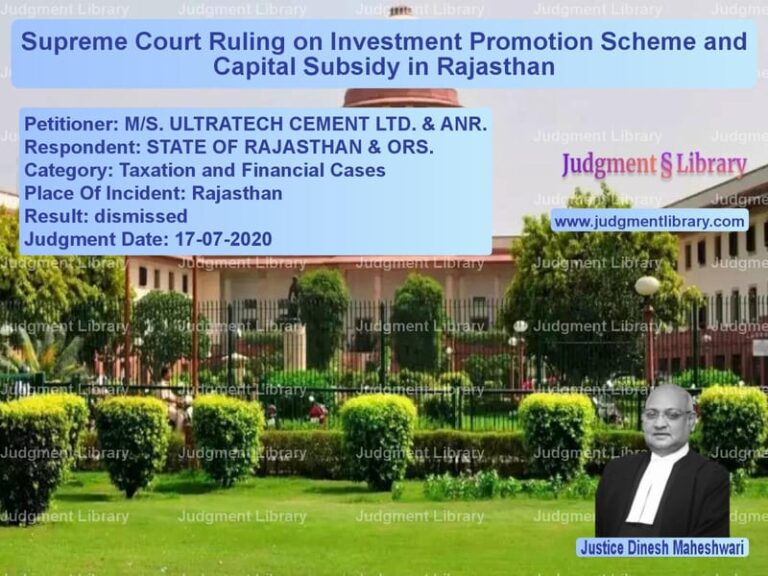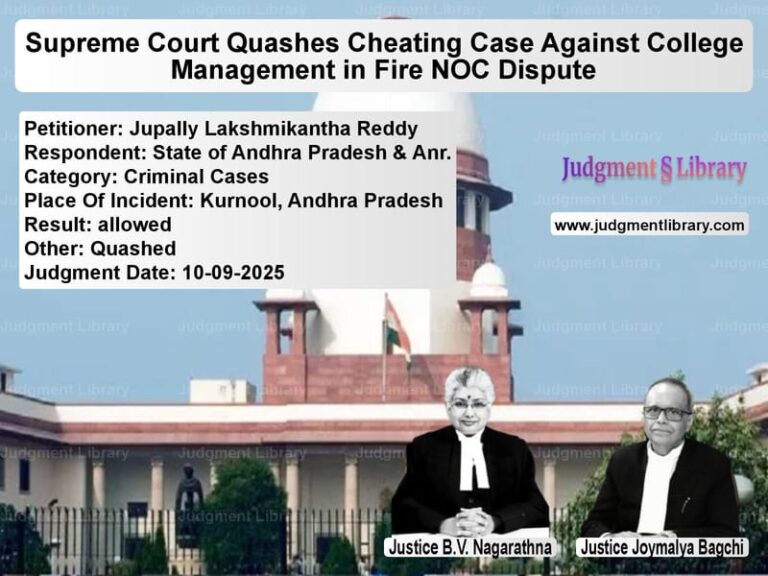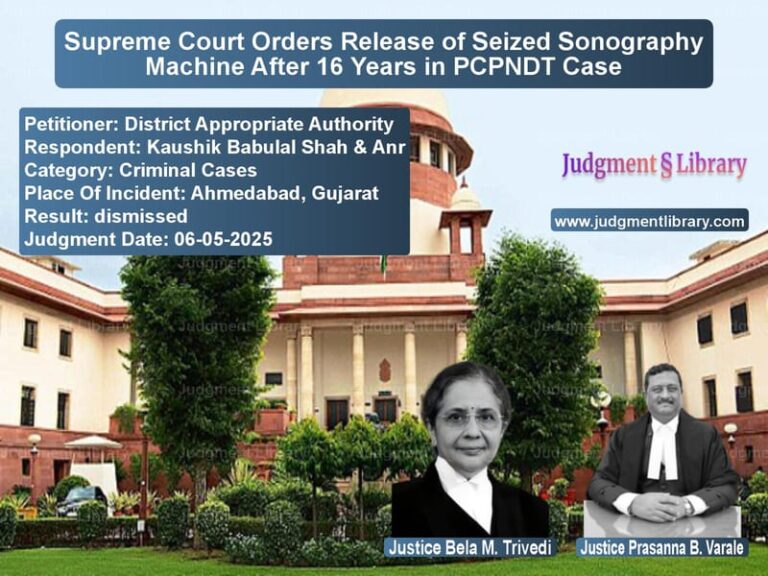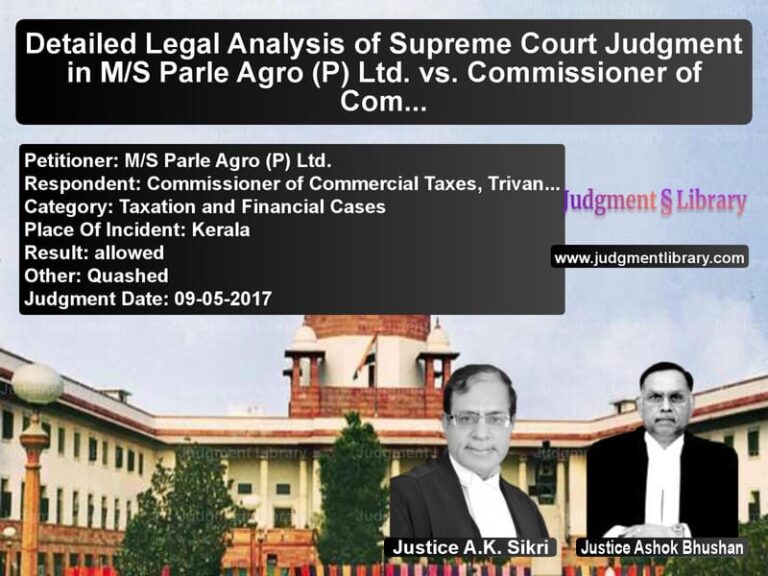Amendment of Pleadings and Enhancement of Damages: Life Insurance Corporation of India v. Sanjeev Builders Pvt. Ltd.
The case of Life Insurance Corporation of India v. Sanjeev Builders Pvt. Ltd. centers on a dispute regarding the amendment of a plaint to enhance the damages claim for non-performance of an agreement. The appellant, Life Insurance Corporation of India (LIC), challenged the High Court’s decision that allowed the plaintiffs, Sanjeev Builders Pvt. Ltd., to amend their plaint in a long-pending suit for specific performance. The amendment sought to increase the amount of damages originally claimed from Rs. 1,01,00,000/- to Rs. 400,01,00,000/-. The appellant argued that such an amendment after more than thirty years was not only belated but was also barred by limitation. The case delves into the application of procedural rules under the Civil Procedure Code (CPC) and the Specific Relief Act, 1963, as well as the discretion exercised by courts in allowing amendments to plaints. This blog post explores the key legal arguments, the reasoning behind the Supreme Court’s decision, and the broader implications for parties seeking amendments in long-pending civil suits.
Background of the Case
The original dispute dates back to 1986 when Sanjeev Builders Pvt. Ltd. filed a suit against Life Insurance Corporation of India (LIC) seeking the specific performance of a contract for the sale of land. The plaintiffs also prayed for damages in the alternative. Over the years, the value of the suit property appreciated significantly, and the plaintiffs sought to enhance the amount of damages to reflect the current market value. In 2017, the plaintiffs filed a Chamber Summons seeking an amendment to their plaint to increase the damages claim from Rs. 1,01,00,000/- to Rs. 400,01,00,000/-, arguing that the delay in prosecuting the suit had resulted in greater loss. The learned Single Judge of the High Court allowed the amendment application, keeping the issue of limitation open for future adjudication. The appellant, LIC, filed an appeal against this decision, which was also dismissed by the Division Bench of the High Court. Aggrieved by this order, LIC filed a Special Leave Petition before the Supreme Court.
Petitioner’s Arguments
The appellant, Life Insurance Corporation of India, presented several arguments to support its case for rejecting the amendment:
- Delay in Amendment: The appellant argued that allowing an amendment after more than thirty years would cause significant prejudice, as the delay in filing the amendment application was not adequately explained by the plaintiffs. They emphasized that the delay was excessive and should bar any amendments related to increasing the damages claim.
- Violation of Order II Rule 2 of the CPC: The appellant contended that the amendment was barred by the provisions of Order II Rule 2 of the Civil Procedure Code (CPC). The rule requires that all claims arising from the same cause of action must be brought together in the same suit. The appellant argued that the plaintiffs had not raised the enhanced damages claim in the original plaint and sought to introduce a new claim by amending the plaint, which they argued was impermissible under the rule.
- Constructive Res Judicata: The appellant raised the issue of constructive res judicata, claiming that the plaintiffs could not raise new claims that were not part of the original suit. They argued that the amendment sought to introduce a new cause of action and was, therefore, barred by the principles of res judicata.
- Inconsistent Pleadings: The appellant also argued that the plaintiffs’ request to enhance the damages was inconsistent with the original pleadings. The claim for Rs. 400,01,00,000/- as damages was substantially higher than the original claim of Rs. 1,01,00,000/-, and the appellant argued that this drastic increase was unfair and prejudicial to its defense.
- Impact of Earlier Judgment: The appellant referred to the earlier judgment in Life Insurance Corporation of India v. Sanjeev Builders Pvt. Ltd. (2018), which involved a similar issue regarding the impleadment of additional parties. The appellant argued that this judgment should apply to the current case, and the amendment should not be allowed based on the reasoning in that judgment.
Respondent’s Arguments
The respondents, Sanjeev Builders Pvt. Ltd., argued in favor of the amendment and rejected the appellant’s claims as follows:
- Discretion of the Court to Allow Amendments: The respondents argued that the High Court had exercised its discretion correctly by allowing the amendment. They emphasized that the court has wide discretion under Order VI Rule 17 of the CPC to allow amendments in the pleadings, and that such amendments should be allowed if they aid in determining the real questions in controversy between the parties.
- No Prejudice to the Appellant: The respondents argued that the amendment would not cause any irreparable prejudice to the appellant, as the defendant could file an additional written statement to address the enhanced damages claim. They further argued that the delay in the amendment did not bar its acceptance, as the amendment sought only to enhance the amount of compensation, not to introduce a new cause of action.
- Limitation Issues: The respondents pointed out that the issue of limitation had been kept open by the High Court and that the appellant could raise the limitation defense at trial. They argued that the delay in the amendment application was not a sufficient reason to reject it outright, as the amendment related to damages and not the main cause of action.
- Consistency of the Claim: The respondents argued that the enhanced damages claim was consistent with the original plaint. They clarified that the original claim for damages had always been based on the same set of facts, and the increased amount was a reflection of the escalation in property value due to the passage of time.
- Nature of the Amendment: The respondents argued that the amendment did not introduce a new cause of action but merely sought to update the amount of damages in light of changed circumstances. They emphasized that the plaintiffs were entitled to claim compensation in addition to the specific performance of the contract, as permitted by Section 21 of the Specific Relief Act, 1963.
The Court’s Reasoning
The Supreme Court, after considering the arguments from both sides, made the following observations:
- Discretion to Allow Amendments: The Court reaffirmed that the power to allow amendments is wide, and amendments should be allowed unless they cause injustice to the other party. The Court emphasized that the amendment was necessary for determining the real questions in controversy and for the effective adjudication of the suit.
- Application of Order II Rule 2 of CPC: The Court clarified that Order II Rule 2 of the CPC applies only to subsequent suits and does not bar amendments in the existing suit. The Court concluded that the amendment sought by the plaintiffs was not barred by the provisions of Order II Rule 2, as it did not introduce a new cause of action but merely updated the amount of damages.
- Constructive Res Judicata: The Court rejected the appellant’s argument of constructive res judicata, stating that the amendment did not seek to introduce a new case but merely updated the relief sought within the same cause of action. The Court observed that the law permits amendments to pleadings to reflect changing circumstances, and such amendments should not be barred by technicalities.
- Principles of Equity and Justice: The Court emphasized the importance of equity in the judicial process, noting that the plaintiffs’ claim for enhanced damages was based on the escalation of property value due to the passage of time. The Court held that the amendment was necessary to avoid further litigation and ensure that the plaintiffs could seek just compensation for their loss.
- Precedent and Judicial Discretion: The Court reviewed the previous judgments, including the decision in Life Insurance Corporation of India v. Sanjeev Builders Pvt. Ltd. (2018), and concluded that the principles in those cases did not apply to the current dispute. The Court emphasized that the High Court had correctly exercised its discretion in allowing the amendment to enhance the damages claim.
The Court’s Decision
The Supreme Court ruled in favor of the respondents and made the following orders:
- Dismissal of the Appeal: The Court dismissed the appeal filed by the appellant and upheld the High Court’s decision allowing the amendment of the plaint.
- Leave to Amend the Claim for Damages: The Court allowed the plaintiffs to amend their plaint to enhance the damages claim, subject to the provisions of the Specific Relief Act, 1963, and the applicable rules of civil procedure.
Conclusion
This case highlights the judicial approach towards amendments in civil suits, particularly in commercial disputes. The Supreme Court’s decision reinforces the principle that amendments should be allowed to reflect changing circumstances, provided they do not cause undue prejudice to the other party. The case also clarifies the application of Order II Rule 2 of the CPC and the principles of constructive res judicata in the context of civil proceedings. It underscores the importance of allowing amendments to ensure that justice is served, especially in long-pending suits where the facts and circumstances may have evolved over time.
Petitioner Name: Life Insurance Corporation of India.Respondent Name: Sanjeev Builders Pvt. Ltd..Judgment By: Justice Aniruddha Bose, Justice J.B. Pardiwala.Place Of Incident: Mumbai.Judgment Date: 01-09-2022.
Don’t miss out on the full details! Download the complete judgment in PDF format below and gain valuable insights instantly!
Download Judgment: life-insurance-corpo-vs-sanjeev-builders-pvt-supreme-court-of-india-judgment-dated-01-09-2022.pdf
Directly Download Judgment: Directly download this Judgment
See all petitions in Contract Disputes
See all petitions in Specific Performance
See all petitions in Damages and Compensation
See all petitions in Debt Recovery
See all petitions in Judgment by Aniruddha Bose
See all petitions in Judgment by J.B. Pardiwala
See all petitions in dismissed
See all petitions in supreme court of India judgments September 2022
See all petitions in 2022 judgments
See all posts in Civil Cases Category
See all allowed petitions in Civil Cases Category
See all Dismissed petitions in Civil Cases Category
See all partially allowed petitions in Civil Cases Category







